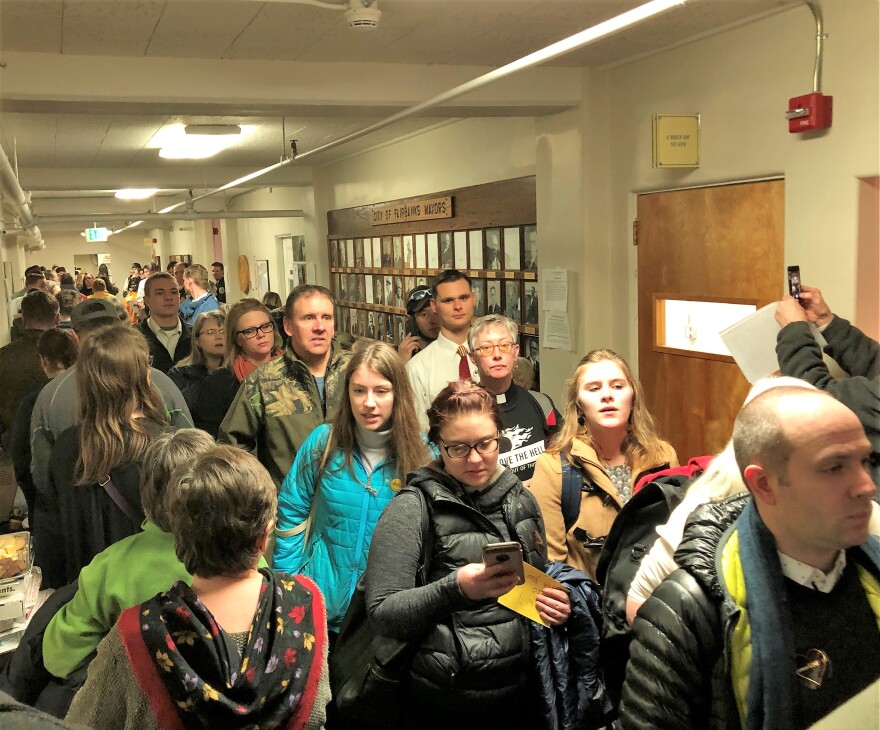The Fairbanks City Council failed to override the mayor’s veto of a controversial civil rights ordinance at their meeting last night. The council then discussed re-working it and trying again in a couple of months. And they did not yet work on a version to put on the municipal ballot in October.
Ordinance six-zero-nine-three (6093) was first heard in December 3rd and was to be voted on after a public hearing on December 10th. But stakeholder groups came out in force for that meeting, and gave the council three hours of testimony, so the council postponed the ordinance until February 25th, and after two more hours of testimony, passed the ordinance four-to-two. David Pruhs and Jerry Cleworth voted no.
Four days later, Fairbanks Mayor Jim Matherly vetoed the ordinance, saying too many out-of-city comments influenced the council, and it would be appropriate to allow only Fairbanks residents to vote on a referendum.
“How are you going to protect this community over the next eight months during this brutal battle we are going to have over a ballot measure.”
Mindy O’Neall was one of many at Monday’s council meeting, who were concerned that acts of discrimination might grow since the mayor’s veto and before an October election.
The ordinance was written as a simple mirror of state and federal civil rights law with clauses about race, color, age, religion, sex, family status and sexual orientation, similar to like local laws in Anchorage, Juneau and Sitka. But it became a larger issue when politically active churches took over public comment about Transgender rights. City Clerk Danyielle Snider says the council has received nearly 400 separate pieces of email and correspondence on this issue.
After the first public hearing, the council held eight different worksessions with hiring and tenant landlord experts, when the mayor told the council to work through clauses on religious and employer exemptions.
“I’d like this to be unanimous. And I’d like this ordinance to be the best way to please the most people.”
After that comment, the mayor’s veto was a surprise to council members who worked through the weeks-long process.
But the veto was welcomed by religious activists who care deeply about their right to discriminate against people who don’t follow their rules. At Monday’s comment period, they gave testimony from the compassionate to the fanciful. Here are Kevin Smith and Danielle Rathman.
“To abhor the lifestyle, that is simply it. But to abhor the person, that would be completely against what we believe. There is not an individual on Planet Earth that I abhor, but the lifestyle, I have to abhor.”
“There are other ways to show our community we care for them than letting men in the women’s bathrooms. I respect my fellow Alaskans, but I do not wish to share the same bathroom with a male.”
When it came time for the council to speak, each member addressed the division in the community created by the debate, but none more strongly than Kathryn Ottersten who spent six minutes strongly rebuking the mayor for his veto.
“And I am ashamed of what you wrote disregarding these people. You like to say the city grows to 50,000 or 60,000 during the day – more during the tourist season. The fact that what happens here, impacts the entire borough, has been disregarded. It sucks to put people’s human rights up to a vote.”
So did Valerie Therrien.
“I’m very disappointed in you, Mayor, for vetoing this ordinance. It is our duty, as elected officials, to protect innocent people in our community, and by vetoing this, you have put them at risk.”
Council member Jerry Cleworth said there were still flaws in the ordinance and he would not vote to over-ride the veto. And when it came time to vote, the overturn failed, leaving the veto in place.
Then curiously, the council started over. Therrien asked about bringing the same ordinance forward again. June Rogers agreed.
“It is realistic for us to continue working on this. And I think that we were so close in agreement earlier, we can do nothing but continue.”
Cleworth and Pruhs asked what it would take to craft an ordinance the whole council would agree on. “I would recommend, ya know, we all do some soul-searching and think, what would it take? There’s about three or four things that it would take for me to sign off on it.”
“It has to be six-zero. I’m willing to go through the heartache, the abuse we get. But then how long do we want to put Fairbanks through it?”
Ottersten asked for a cooling-off period before the council took up the issue again, and the council agreed.


